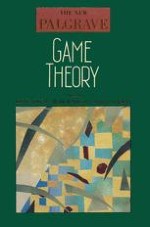1989 | OriginalPaper | Buchkapitel
Perfect Information
verfasst von : Leonard J. Mirman
Erschienen in: Game Theory
Verlag: Palgrave Macmillan UK
Enthalten in: Professional Book Archive
Aktivieren Sie unsere intelligente Suche, um passende Fachinhalte oder Patente zu finden.
Wählen Sie Textabschnitte aus um mit Künstlicher Intelligenz passenden Patente zu finden. powered by
Markieren Sie Textabschnitte, um KI-gestützt weitere passende Inhalte zu finden. powered by
Perfect information is usually thought of as complete knowledge of a person’s economic environment. It is clear that nobody in a real economy has perfect knowledge about every aspect of the economy. However, it has been argued that perfect knowledge is unnecessary since the price system summarizes all necessary information. Under this line of reasoning the only information that economic agents need are their own tastes and prices. This seems like a very naive argument. The real world is more complicated than this argument suggests. Even the prices system itself is not so simple: there are nonlinear prices, e.g. quantity discounts, as well as different prices for exactly the same commodity. Moreover the economy would function quite differently if the information structure was different, for example if all agents had more knowledge about economic variables. Hence the question arises: how are prices and information used in ideal models of the economy where many very complicated real world relationships have been simplified? In the following discussion the effect of information and the value of prices in conveying and summarizing this information in economic models is described. It appears that in economic models of the economy the ‘information content’ of prices is not as valuable as it appears on the surface. A well-functioning economy needs much more information than is contained in the price system.
